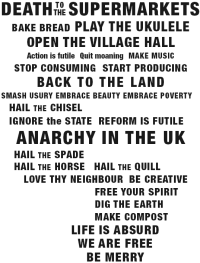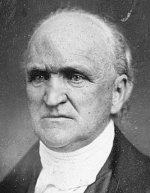I’ve just finished reading (skimming, really), Tom Hodgkinson’s The Freedom Manifesto (a.k.a. How to be Free).
I seem to have a soft spot for eccentrically reactionary radicals. For a while, I was eagerly reading up on the anarcho-primitivists, who thought civilization was a bad idea and that mankind had taken a wrong turn when we started messing around with things like cities, agriculture, and literacy. And you may remember when I reviewed Bill Kauffman’s Look Homeward, America: In Search of Reactionary Radicals and Front-Porch Anarchists, which had a soft spot for the American isolationist, regionalist, anti-cosmopolitan tendencies of the early 20th century.
Hodgkinson is an English punk rock radical who finds his model for human society in a romantically-evoked version of medieval Europe that has since been destroyed by the Protestant reformation’s war against the assimilated paganism of the Catholic church, by capitalism’s assault on guilds and crafts, and by the victory of Puritanism over joy and nature.
Hodgkinson is the co-founder and editor of The Idler, which hopes to defend the point of view of the Grasshopper who was unfairly maligned in Aesop’s pro-ant propaganda.
His book is a series of exhortations intended to inspire the reader to stop being the conforming, clock-watching, urban, employed, worried, lonely, rude, guilty, accumulating consumer, and instead to go back to the land, slack off, indulge simple pleasures, stop worrying about the future, stop feeling guilty, take up the ukulele, and start cashing in on the pleasures of being a roustabout bon vivant.
It’s full of quotes on this theme from the likes of William Blake, Guy Debord, E.F. Schumacher, Friedrich Nietzsche, Thomas Aquinas, Pyotr Kropotkin, William Godwin, Leo Tolstoy, Robert Burton, Jean-Paul Sartre, Bertrand Russell, and Penny Rimbaud. You know, Penny Rimbaud of Crass. (To give the kids of today some context, Hodgkinson notes that Tolstoy “was the late-nineteenth-century equivalent of Crass” — Crass being the late-twentieth-century equivalent of, I dunno, Chumbawumba or something.) Obligatory tax resistance pullquote follows:
It is perfectly possible to create an uncomplicated, job-free life. Artists Penny Rimbaud and Gee Vaucher started Crass, the anarchist punk band of the eighties. Forty years ago they rented a tumbledown house just outside London and renovated it and filled the garden with flowers, fruit, vegetables, sheds and arbours for quiet repose. Thanks to an open-house policy, which has ensured a steady flow of helpful residents and guests, they have been able to develop the house and grounds to a high standard with very little money. People power replaced cash. They keep things simple, they don’t need jobs, and that gives them acres and acres of free mind-space to follow their own paths through life, to think, read, write, talk, drink, make art. Their income is virtually nothing, but they do exactly what they want and this, it seems to me, is a tremendous achievement. It proves that money and freedom are by no means synonymous. Gee said to me, “I don’t think I’ve ever paid tax. How much do you need to earn? £5,000 a year? I don’t earn anything like that.” And a more bill-free and liberated household I have never seen.
The book didn’t do much for me, but I’m already a believer in what I think is the most evident and important message of the book: take responsibility for your life; make an honest and necessarily radical reassessment of your priorities that will certainly involve unlearning the ones you have absorbed from a childhood overdose of public school, media, and commercial propaganda; and start living creatively according to what you uncover in this way. Or, as Hodgkinson puts it:
Don’t bother setting up free republics or moving to a country which offers more liberties. Simply declare yourself to be an independent state. Do not involve and coerce others. This is the only way we will effect a proper revolution. Once each of us recognizes our own freedom and our own responsibility, then the chains that bind us will fall away.
And that excerpt comes from his chapter on cultivating good manners and avoiding rudeness — perhaps not what you’d expect to find in an anti-puritan punk rocker’s book about thumbing your nose at workaday living.
If you can deal with the fact that it’s Brit-centric (a mental search-and-replace that swaps “john” for “loo” and “WalMart” for “Tesco’s” will probably do the trick) and that it includes a heaping helping of bollocks, and if you’re unable to work up the gumption to get you out of your cubicle and back to living, this might be the kick-in-the-pants you need.



